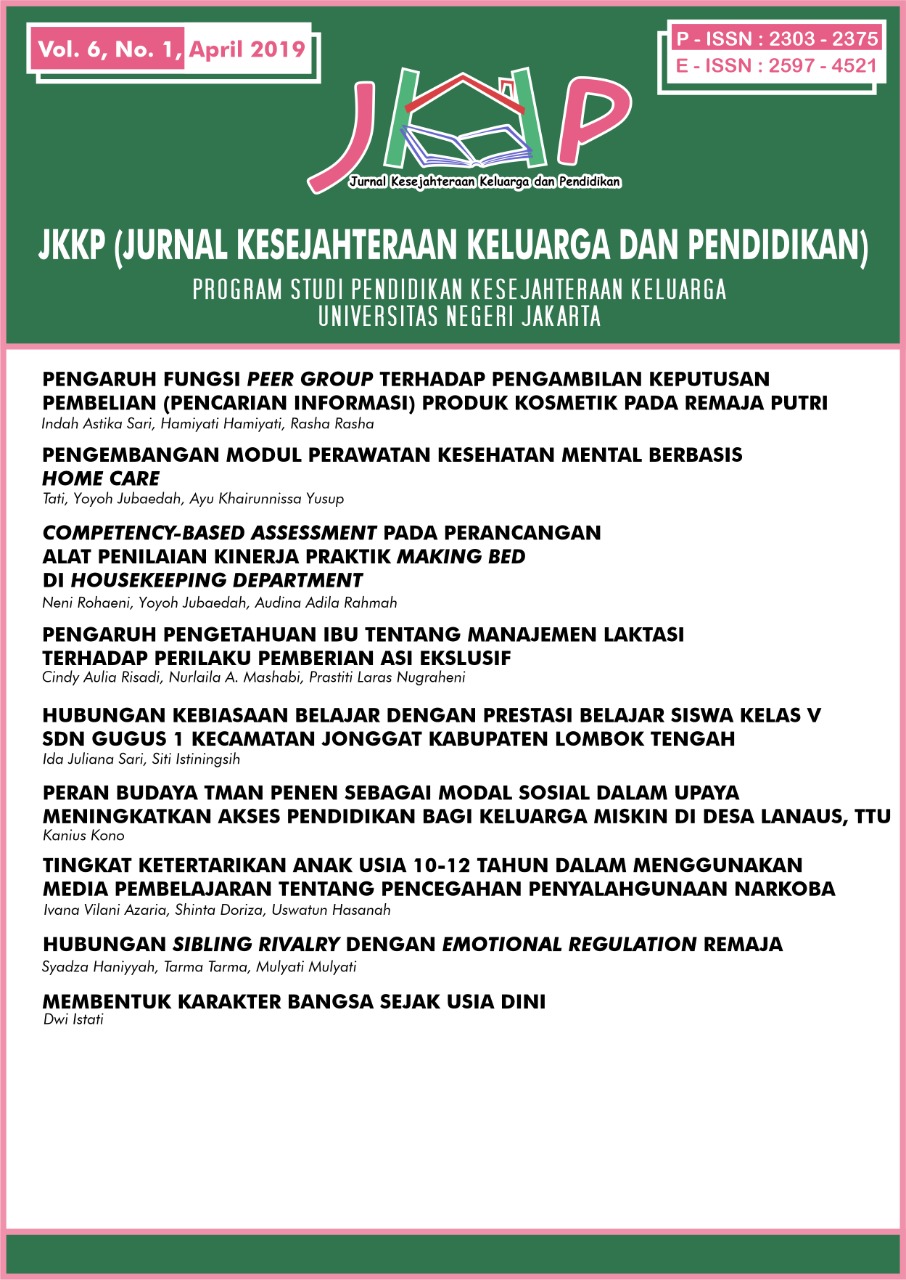HUBUNGAN KEBIASAAN BELAJAR DENGAN PRESTASI BELAJAR SISWA KELAS V SDN GUGUS 1 KECAMATAAN JONGGAT KABUPATEN LOMBOK TENGAH
DOI:
https://doi.org/10.21009/JKKP.061.05Keywords:
study habits, learning achievementAbstract
This study was conducted to find out 1) how the learning habits of fifth grade students in Ganggug 1 Elementary School, Jonggat Subdistrict, Central Lombok Regency, 2) how is the learning outcome of class V students, and 3) is there a significant relationship between learning habits and the learning achievement of fifth grade students in Cluster 1 Elementary School. The method in this study is the correlation method. The population in this study were class V which numbered 117 with a sample of 54 students. The sampling technique is done by random sampling. Data collection techniques in this study by observation, questionnaire, and documentation were analyzed using descriptive statistical analysis. The analysis prerequisite test includes data normality test and regression linearity test. Hypothesis testing includes Product Moment correlation test. The results showed that: (1) the learning habits of fifth grade students with a percentage of 43% were classified as high; (2) student learning achievements with a percentage of 55% classified as very high; (3) there is a significant relationship between study habits and learning achievement indicated by the existence of tcount <t table (0.02 <0.05) and significance of 0.05, the correlation in this study is classified as moderate. The conclusion of this study is that there is a significant relationship between study habits and learning achievement, and is classified as moderate. Suggestions teachers must pay attention and monitor student learning achievement by giving guidance and motivation so that more enthusiasm in learning and students can get used to learning optimally.
Abstrak
Penelitian ini dilaksanakan untuk mengetahui 1) bagaimanakah kebiasaan belajar siswa kelas V di SDN Gugus 1 Kecamatan Jonggat Kabupaten Lombok Tengah, 2) bagaimanakah pestasi belajar siswa kelas V di SDN Gugus 1 Kecamatan Jonggat Tahun Pelajaran Kabupaten Lombok Tengah, dan3) apakah ada hubungan yang signifikan antara kebiasaan belajar dengan prestasi belajar siswa kelas V di SDN Gugus 1 Kecamatan Jonggat Kabupaten Lombok Tengah. Metode dalam penelitian ini dengan metode korelasi. Populasi dalam penelitian ini yaitu siswa kelas V SDN Gugus 1 Kecamatan Jonggat yang berjumlah 117 dengan jumlah sampel 54 siswa. Teknik pengambilan sampel dilakukan dengan cara random sampling. Teknik pengumpulan data dalam penelitian ini dengan observasi, angket, dan dokumentasi yang dianalisis menggunakan analisis statistik deskriptif. Uji prasyarat analisis meliputi uji normalitas data dan uji linieritas regresi. Uji hipotesis meliputi uji korelasi Product Moment. Hasil penelitian menunjukkan bahwa: (1) kebiasaan belajar siswa kelas V dengan persentase 43% tergolong tinggi ; (2) prestasi belajar siswa dengan persentase 55% tergolong sangat tinggi; (3) ada hubungan yang signifikan antara kebiasaan belajar dengan prestasi belajar ditunjukkan dengan adanya thitung <ttabel (0,02<0,05) dan taraf signifikansi 0,05, korelasi dalam penelitian ini tergolong sedang. Simpulan dari penelitian ini adalah terdapat hubungan yang signifikan antara kebiasaan belajar dengan prestasi belajar, dan tergolong sedang. Saran guru harus memperhatikan dan memantau prestasi belajar siswa dengan memberi bimbingan dan motivasi agar lebih semangat dalam belajarnya serta siswa dapat membiasakan diri belajar secara optimal.
Downloads
Published
Issue
Section
License
Authors who publish with this Journal agree to the following terms:
- Author retain copyright and grant the journal right of first publication with the work simultaneously licensed under a creative commons attribution licensethat allow others to share the work within an acknowledgement of the work’s authorship and initial publication of this journal.
- Authors are able to enter into separate, additional contractual arrangementfor the non-exclusive distribution of the journal’s published version of the work (e.g. acknowledgement of its initial publication in this journal).
- Authors are permitted and encouraged to post their work online(e.g. in institutional repositories or on their websites) prior to and during the submission process, as it can lead to productive exchanges, as well as earlier and greater citation of published works.
Users/public use of this website will be licensed to CC BY SA
![]()







